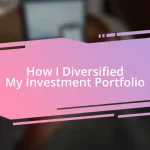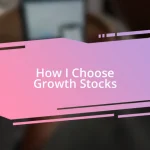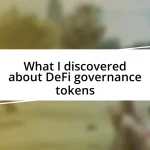Key takeaways:
- Blockchain promotes trust and security through its immutable nature, which has potential applications in various sectors like healthcare and supply chain management.
- Current trends include the rise of decentralized finance (DeFi), the integration of non-fungible tokens (NFTs), and a growing focus on sustainability in blockchain practices.
- Future applications may revolutionize supply chain transparency, enhance healthcare data management, and improve voting systems, while scalability and energy efficiency will be crucial for broader adoption.

Understanding blockchain technology
Blockchain technology is essentially a decentralized digital ledger that records transactions across multiple computers. What fascinates me about this technology is how it promotes trust; since every participant has access to the same record, it reduces the risk of fraud. I remember when I first learned about how cryptocurrencies like Bitcoin used blockchain. I couldn’t help but wonder: could this technology really transform industries beyond finance?
One of the core features of blockchain is its immutability, meaning that once a record is added, it cannot be altered or deleted. This bit of information really struck me; it feels almost liberating, doesn’t it? I often think about the implications this has for sectors like healthcare and supply chain management. Imagine a world where medical records are secure but accessible to those who need them—what a game changer that would be!
Another intriguing aspect is the concept of smart contracts. These self-executing contracts run on the blockchain, automatically enforcing and executing terms when conditions are met. It’s like having a digital assistant that ensures everything runs smoothly without manual intervention. I can’t help but ask, how many disputes could be resolved with such technology? I see immense potential here that could streamline processes across various fields, making things a lot more efficient.

Current trends in blockchain
The current landscape of blockchain is buzzing with innovation and growth. One trend that truly catches my attention is the rise of decentralized finance, or DeFi. It’s incredible to see how traditional financial services are being reimagined on a blockchain, allowing for peer-to-peer transactions that cut out intermediaries. I recently experimented with DeFi platforms myself, and the empowerment I felt to manage my finances directly was amazing—it’s like having control over my money in ways I never thought possible!
Another trend I find exciting is the integration of non-fungible tokens (NFTs) across various industries. Beyond art and collectibles, NFTs are making waves in sectors like gaming, where digital ownership has become a reality. I vividly recall participating in a game that allowed me to earn and trade unique in-game assets as NFTs. The thrill of knowing that I truly owned these items, and could sell them if I wanted, was quite unexpected!
Moreover, there’s a growing focus on sustainability within blockchain technology. More projects are prioritizing eco-friendly practices to address the environmental concerns associated with blockchain mining. This trend resonates deeply with me because I believe technology should be part of the solution, not the problem. It’s refreshing to see advancements like proof-of-stake protocols gaining traction, as they significantly reduce energy consumption compared to traditional proof-of-work systems.
| Trend | Description |
|---|---|
| Decentralized Finance (DeFi) | Transforming traditional finance through peer-to-peer transactions on blockchain. |
| Non-Fungible Tokens (NFTs) | Providing unique digital ownership across industries, especially gaming and art. |
| Sustainability | Prioritizing eco-friendly practices and reduced energy consumption in blockchain operations. |

Challenges facing blockchain adoption
Blockchain technology is undeniably revolutionary, but it’s not without its challenges. One significant hurdle I often reflect on is the regulatory landscape surrounding blockchain. Governments worldwide are still figuring out how to classify and regulate cryptocurrencies and blockchain applications, which can create uncertainty for businesses looking to adopt this technology. I remember a conversation with a startup founder who was hesitant to dive into blockchain simply due to the fear of changing regulations. It’s a valid concern, as navigating this maze can feel daunting.
- Regulatory Uncertainty: Different countries have varying laws, making compliance complicated.
- Scalability Issues: Many blockchains struggle to handle a large number of transactions quickly and efficiently.
- User Adoption: While blockchain has potential, getting everyday users on board can be difficult due to a lack of understanding.
- Energy Consumption: Some blockchain platforms, especially those using proof-of-work, can consume vast amounts of energy, raising environmental concerns.
On top of that, there’s the matter of user adoption. I think back to a workshop I attended where attendees were introduced to blockchain for the first time. Many expressed skepticism and confusion, as they couldn’t see how it applied to their daily lives. The gap between technical knowledge and mainstream understanding remains broad. It can feel a bit like trying to explain the internet to someone who has never used a computer; the potential is endless, but the lack of familiarity can hold back progress.

Future applications of blockchain
The future applications of blockchain are as dynamic as they are promising. One area I’m particularly intrigued by is supply chain management. Imagine a world where each step of a product’s journey from origin to consumer is transparently documented on a blockchain. Recently, I read about a company utilizing this technology to trace the origins of its coffee beans. It was incredible to see how consumers could scan a QR code and instantly learn about the farmers and processes behind their favorite brew. This level of transparency could revolutionize trust in consumer goods.
Additionally, the healthcare sector stands to gain tremendously from blockchain. With patient data often scattered across various platforms, blockchain can centralize and secure this information, providing authorized users with real-time access. I recall discussing this with a healthcare professional who expressed frustration over data silos that hinder effective patient care. By leveraging blockchain, patients could own their health data, granting access to doctors at their discretion. How amazing would it be if patients had the power to seamlessly share their medical history, ensuring better outcomes?
Moreover, I see great potential in using blockchain for voting systems. The idea of casting a vote through a secure blockchain app excites me. It could tackle issues like voter fraud and ensure that each vote is verifiable and immutable. Picture a world where everyone feels confident that their vote truly counts. I often wonder: could this level of security and transparency finally revitalize public trust in electoral processes?

Predictions for blockchain evolution
As I think about the evolution of blockchain, I believe it will become more integrated into everyday business processes. We’re already seeing early adopters transform record-keeping and transaction systems. I can’t help but feel excitement imagining a future where small businesses can enhance trust and transparency through blockchain without needing extensive technical insight. What if every small shop had a simple interface showing the authenticity of their products?
On another note, I predict that innovations in scalability will be pivotal for blockchain’s adoption. As I reminisce about discussions with tech enthusiasts, it’s clear that figuring out how to handle millions of simultaneous transactions efficiently will be the key. For instance, if blockchain networks could process transactions at the speed of credit cards, it might encourage more traditional businesses to integrate this technology without fear of delays.
Finally, I foresee a growing emphasis on energy-efficient blockchain solutions. Having seen firsthand the shift towards sustainability in various industries, I feel strongly that options like proof-of-stake will gain traction. With increasing awareness of environmental issues, it makes me hopeful that blockchain can evolve in a way that contributes to sustainability. Can you imagine a world where we enjoy the benefits of blockchain without the ecological toll?














